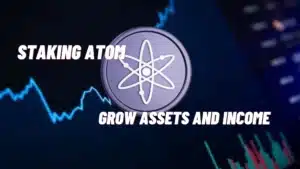This is article 11/11 in Part II of our series, How To Build Wealth and Grow Crypto Assets and Income by Staking. We’re finally at the end of the series and sincerely hope you have learned something and enjoyed it.
To read any of the previous articles click the button below.
Key Takeaways
- Staking rewards are taxable
- It is important to keep proper records
- Consult a tax professional
- Stay up-to-date with crypto regulation in your jurisdiction
Are crypto staking rewards taxable?
Understanding the tax implications and regulatory requirements of staking is crucial to effectively manage your finances.
In this article, we will discuss the tax treatment of staking rewards, record-keeping and reporting requirements, and cover several regulatory developments in the crypto space.
The specific tax treatment may vary depending on the laws in your jurisdiction.
Tax treatment of staking rewards in the United States

Staking rewards are taxable income, similar to interest or stock dividends.
Income tax: In the United States, staking rewards are considered unearned portfolio income, like stock dividends and they are subject to income tax. That means you must report the fair market value of your staking rewards on your tax return.
The FMV of your staking rewards is the number of tokens claimed multiplied by the market price per token the moment you claimed them. Your applicable tax rate will depend on your overall income level.
Capital gains tax: In the United States, crypto sales are subject to capital gains tax. You must report the gains when you sell or exchange tokens. Your cost basis is the Fair Market Value of the staking rewards when you claim the tokens.
The applicable tax rate will depend on the holding period and the amount of gain realized when you sell or trade them.
The good news is that you can also report a loss to offset other gains.
Tax treatment of staking rewards in Canada

The Canada Revenue Agency (CRA) considers staking rewards to be income from a business or property. Taxpayers must report the rewards as income on their tax return.
Check this Canadian guide to regulation and taxation.
Tax treatment of staking rewards in the European Union

Tax treatment of staking rewards varies across EU member states. In some countries, staking rewards may be subject to income tax. Others may apply capital gains tax or a combination of both.
Check with the European Commission.
Tax treatment of staking rewards in Dubai

And the winner is… Dubai!
As of September 2023, cryptocurrencies are not taxable in Dubai. The United Arab Emirates (UAE) may be the most crypto-friendly jurisdiction on the planet.
Dubai is rolling out the red carpet to welcome Web3 developers and builders in their quest to become the leading global technology hub.
We sure wish the United States would wake up. The culture in Dubai isn’t for everyone and work visas can be difficult to obtain, but some of the smartest, most talented tech professionals in the world are moving there to set up shop.
Crypto record-keeping and reporting requirements

Proper record-keeping is essential to ensure tax compliance but is also good general practice. It’s nice to find transaction records when you are in need of info. You should maintain accurate records of your staking activities, including:
- The date and amount of each staking reward received.
- The fair market value of the rewards at the time they were received.
- Any associated fees or expenses related to staking.
These records will be necessary when preparing your tax return and may be requested by tax authorities in case of an audit.
Check out services, like Koinly and Blockpit to keep track of your crypto transactions.
Regulatory developments in the crypto space
Regulatory developments can significantly impact staking and other investment activities. Some recent examples include:
- The European Union’s proposed Markets in Crypto-Assets (MiCA) regulation: The MiCA aims to create a comprehensive framework for digital assets, including staking activities. The proposal is still under discussion and its final form and impact on staking activities remain to be seen.
Check this global crypto regulation tracker to stay up-to-date. - The U.S. infrastructure bill: The recently passed infrastructure bill includes provisions that could impact crypto taxation and reporting requirements. Since the exact implications are unclear, staying informed about the developments is crucial.
Check this U.S. crypto regulation tracker to stay up-to-date.
Stay informed about regulatory developments in your jurisdiction by following news sources and industry updates.
Nothing in this article is a substitute for speaking to a tax advisor. Consult with a tax professional to ensure you are compliant with current and future tax regulations. Be prepared to adjust your investment strategy as needed in response to regulatory changes.
Following these steps will allow you to maintain control over your financial future.
We truly hope you’ve enjoyed this 2-part series on building wealth. We would be honored to have you as a staking partner!
If you own MATIC, ATOM, or KAVA tokens and are looking to put them to work and stake them, please consider us at Blocks United.
Frequently Asked Questions
The only legal way to avoid paying taxes on crypto is by investing in an IRA. Or, move to Dubai.
You take the price of the tokens that you sold minus the price that you paid for them and have either a gain or a loss. Any gain is subject to capital gains tax. A loss can be deducted to offset other gains, or carried forward into following years.
On form 1040 you will be asked if you received, sold, sent, exchanged, or otherwise acquired any financial interest in any virtual currency.
No, you do not have to report crypto losses on your taxes. However, it is to your benefit to report losses because they offset gains and can be carried forward into other years.
The only way to legally avoid paying taxes is by trading crypto within an IRA. Or, move to Dubai.
While the IRS does not know who owns a certain wallet address, you should assume they are monitoring public blockchains. You should assume they have a record of all addresses you have sent funds to from a centralized exchange. All trading done on centralized exchanges in the U.S. is reported by the exchanges to the IRS. They do that by issuing their users a 1099.
The IRS wants to know who has invested in crypto and will ask on form 1040. The IRS is mostly interested in your gains. They want to know if you sold crypto at a profit and collect taxes owed on those gains. Simply holding crypto will not incur any taxation as of 2023. Buying and selling is what incurs potential tax burden.
We sampled Accointing, Koinly, Zenledger and Cointracking. Accointing was the easiest to use. Koinly came in second place. All are free to try.
Nothing we say is financial advice or a recommendation to buy or sell anything. Cryptocurrency is a highly speculative asset class. Staking crypto tokens carries additional risks, including but not limited to smart-contract exploitation, poor validator performance or slashing, token price volatility, loss or theft, lockup periods, and illiquidity. Past performance is not indicative of future results. Never invest more than you can afford to lose. Additionally, the information contained in our articles, social media posts, emails, and on our website is not intended as, and shall not be understood or construed as financial advice. We are not attorneys, accountants, or financial advisors, nor are we holding ourselves out to be. The information contained in our articles, social media posts, emails, and on our website is not a substitute for financial advice from a professional who is aware of the facts and circumstances of your individual situation. We have done our best to ensure that the information provided in our articles, social media posts, emails, and the resources on our website are accurate and provide valuable information. Regardless of anything to the contrary, nothing available in our articles, social media posts, website, or emails should be understood as a recommendation to buy or sell anything and make any investment or financial decisions without consulting with a financial professional to address your particular situation. Blocks United expressly recommends that you seek advice from a professional. Neither Blocks United nor any of its employees or owners shall be held liable or responsible for any errors or omissions in our articles, in our social media posts, in our emails, or on our website, or for any damage or financial losses you may suffer. The decisions you make belong to you and you only, so always Do Your Own Research.









